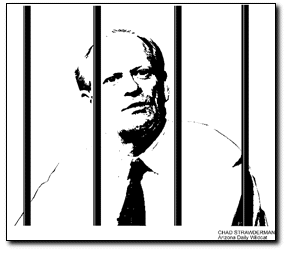![]()
![[ OPINIONS ]](/images/fall97/opinionsf97.gif)
![]()
By Zach Thomas
Arizona Daily Wildcat February 6, 1998
Free Fife!
![[Picture]](05_1_i.gif)
Zach Thomas |
Thirty months in a minimum security facility. Billiards and basketball in
his free time. Movies in a 100-person theater, along with late-night ESPN
on cable.
In Las Vegas, no less.
This is the latest line of speculation fed to an naive public by professional reporters who claim to report important ramifications stemming from the case of governor-turned-convict Fife Symington.
Symington, who was sentenced Monday on federal bank and wire fraud charges, may go to a minimum security prison at Nellis Air Force Base in Nevada, these reporters write.
For that matter, he may become close personal friends with his roommates, known respectively as Bubbas 1, 2 and 3.
He may come away from the prison experience a changed man.
Or he may have no such experience and get off scot-free on appeal.
The latter is most likely.
Former Gov. J. Fife Symington III will not do a lick of prison time nor should he - and you heard it here first.
Why is this not a travesty of justice?
Not because of the questionable dismissal of admittedly pro-Symington juror Mary Jane Cotey after the jury began deliberations.
Not because of lingering doubt surrounding alleged financial improprieties for which he was convicted.
Both of these are, of course, legitimate reasons for an appellate judge to overturn Symington's initial conviction. And removed from the politically charged Phoenix climate, an appellate court probably will use one of those two reasons as an excuse.
But that's not the real reason he should get off.
I like to think Symington won't go to prison because justice has a tendency to prevail, and neither Symington's conviction nor his sentence are just. There is no lingering doubt about his alleged financial improprieties. His dealings were not improper.
He was playing by the rules of the game and that game is business.
The case against Symington boiled down to personal financial statements he submitted to various banks and lenders. Depending on the addressee, these statements indicated different degrees of wealth despite having been compiled at about the same time.
I say again: this is part of the business game.
You make yourself look as financially good as you can if you want to attract investors. You make yourself look as poor as you can when you report your net worth to, say, the Internal Revenue Service.
These are the rules, and players, including Symington and his creditors, understand that this is how business is done.
How do I know this? Because I've asked.
Some business owners I've talked to have told me they engage in similar practices to maximize their profit - albeit using fewer zeros than Symington did.

Making money - that's the point of being in business, isn't it? The ironic thing here is the public also engages in this sort of thing.
When you fill out a credit card application, the chaise lounge that's collecting dust on your porch suddenly becomes a $500 antique chair and the TV in the closet that hasn't worked for months suddenly is worth the $450 it was purchased for back in 1974.
Do you catch my drift?
When you fill out a resume, you don't describe your last job as "gopher and general gimp for a major corporate president's lackey." No, you were "executive assistant to the vice president of consumer relations."
The mitigating factor in the Symington case is that federal prosecutors came in and tried him under a different set of rules - essentially using nitpicky regulations that hold no water in the real world.
Conventional wisdom holds that were Symington not governor and just another millionaire developer, there's no way the U.S. Attorney's office would have pursued a five-year investigation that boiled down to conflicting personal financial statements.
Although federal prosecutors may consider the conflicting statements technically illegal, they should not be considered improper if other businessmen and women are not held to the same standard.
You can question to your heart's content whether businesspeople should be allowed this ability, but the fact is they are. And these are honest businesspeople who realize that valuations of stranded assets, such as Symington's real estate projects, change not only depending on the market, but depending on who you talk to.
For the record, I didn't like Fife the politician. His strong-arm version of "politics like a business" disgusted me, as corporate interests received seemingly exclusive access and attention while Arizona's population was largely ignored.
But getting him out of office on technicality charges sets a bad precedent if prosecutors are unwilling to go after "offenders" who don't happen to be high-profile state governors.
Increased public and press scrutiny should not mean that a leader (be s/he governor, president or royal magistrate) get held to higher ethical standards that their peers.
It almost makes the Symington case qualify under an ethical ex post facto law - were there such a law on the books.
Zach Thomas is an international studies and journalism senior. He covers the State Capitol on a journalism fellowship.



